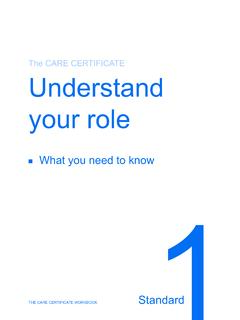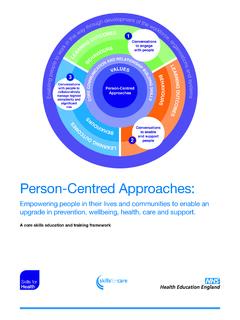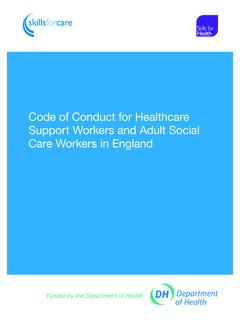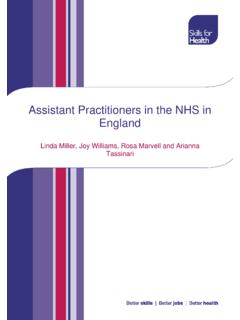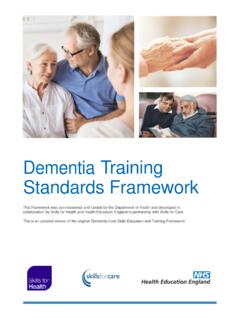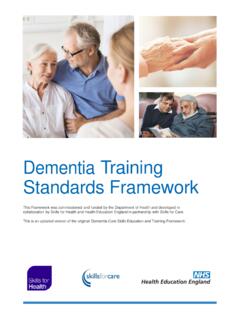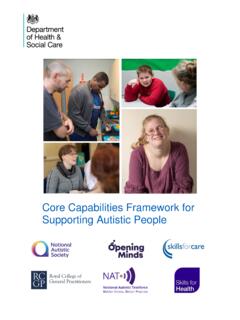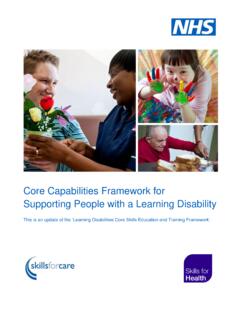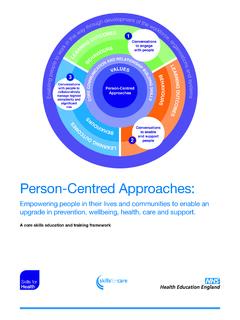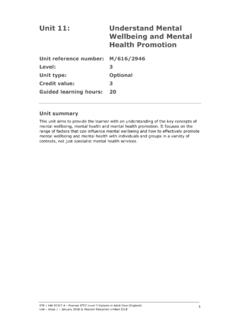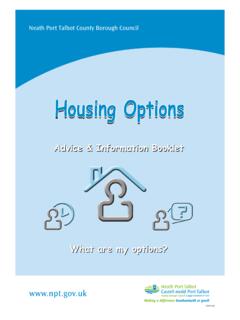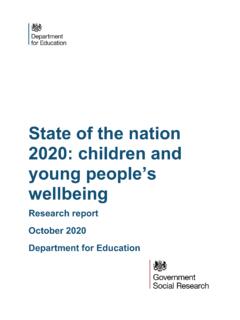Transcription of The Care Certificate Standards - Skills for Health
1 The Care Certificate Framework ( Standards ) Copyright Health Education England, Skills for Care and Skills for Health 1 The Care Certificate Standards The Care Certificate Framework ( Standards ) Copyright Health Education England, Skills for Care and Skills for Health 2 What is the Care Certificate ? The Care Certificate is an identified set of Standards that Health and social care workers adhere to in their daily working life. Designed with the non-regulated workforce1 in mind, the Care Certificate gives everyone the confidence that these workers have the same introductory Skills , knowledge and behaviours to provide compassionate, safe and high quality care and support. Regulated staff ( Doctors, Nurses, Social Workers, Occupational Therapists) gain similar Skills and knowledge within their professional training so they do not need to also achieve the Care Certificate .
2 The Care Certificate : applies across Health and social care; links to competences (National Occupational Standards ) and units in qualifications; covers what is required to be caring; will equip workers with the fundamental skill they need to provide quality care; and gives them a basis from which they can further develop your knowledge and Skills as their career progresses. What are the Standards ? The 15 Standards in the Care Certificate are: 1. understand your role 2. Your personal development 3. Duty of care 4. Equality and diversity 5. Work in a person centred way 6. Communication 7. Privacy and dignity 8. Fluids and nutrition 9. Awareness of mental Health , dementia and learning disability 10. Safeguarding adults 11. Safeguarding Children 12. Basic Life Support 13. Health and Safety 14. Handling information 15. Infection prevention and control Full details of each standard will be covered in the following pages.
3 1 In Health roles may include: Assistant Practitioner, Care Assistant, Healthcare Support Worker, Maternity Support Worker, Nursing Assistant, Occupational Therapy Assistant, Physiotherapy Assistant, Radiography Assistant, Speech and Language Therapy Assistant, Senior Care Assistant. In Adult Social Care roles may include: Activities worker, Day Care Assistant, Day Care Officer, Domiciliary care worker, Home care worker, Nursing Assistant (in a nursing home or a hospice), Personal Assistants, Reablement Assistant, Residential Care Worker, Senior Home Care Worker, Support Worker. Other roles may be included where achievement of all of the Standards is possible. The Care Certificate Framework ( Standards ) Copyright Health Education England, Skills for Care and Skills for Health 3 Is more information available? If you require information about how the Care Certificate is assessed and certified please see: Health Education England or Skills for Care or Skills for Health The Care Certificate Framework ( Standards ) Copyright Health Education England, Skills for Care and Skills for Health 4 Standard 1: understand Your Role Outcome The learner is able to: Assessment The learner must.
4 understand their own role Describe their main duties and responsibilities List the Standards and codes of conduct and practice that relate to their role Demonstrate that they are working in accordance with the agreed ways of working with their employer Explain how their previous experiences, attitudes and beliefs may affect the way they work Work in ways that have been agreed with their employer Describe their employment rights and responsibilities List the aims, objectives and values of the service in which they work Explain why it is important to work in ways that are agreed with their employer Demonstrate how to access full and up-to-date details of agreed ways of working that are relevant to their role Explain how and when to escalate any concerns they might have (whistleblowing) Explain why it is important to be honest and identify where errors may have occurred and to tell the appropriate person understand working relationships in Health and social care Describe their responsibilities to the individuals they support Explain how a working relationship is different from a personal relationship Describe different working relationships in Health and social care settings Work in partnership with others Explain why it is important to work in teams and in partnership with others.
5 Explain why it is important to work in partnership with key people, advocates and others who are significant to an individual Demonstrate behaviours, attitudes and ways of working that can help improve partnership working. Demonstrate how and when to access support and advice about: partnership working resolving conflicts The Care Certificate Framework ( Standards ) Copyright Health Education England, Skills for Care and Skills for Health 5 Standard 2: Your personal development Outcome The learner is able to: Assessment The learner must: Agree a personal development plan Identify sources of support for their own learning and development Describe the process for agreeing a personal development plan and who should be involved Explain why feedback from others is important in helping to develop and improve the way they work Contribute to drawing up own personal development plan Agree a personal development plan Develop their knowledge, Skills and understanding Describe the functional level of literacy, numeracy and communication Skills necessary to carry out their role Explain how to check their current level of literacy, numeracy and communication Skills Describe how a learning activity has improved their own knowledge, Skills and understanding Describe how reflecting on a situation has improved their own knowledge.
6 Skills and understanding Describe how feedback from others has developed their own knowledge, Skills and understanding Demonstrate how to measure their own knowledge, performance and understanding against relevant Standards List the learning opportunities available to them and how they can use them to improve the way they work Demonstrate how to record progress in relation to their personal development Explain why continuing professional development is important The Care Certificate Framework ( Standards ) Copyright Health Education England, Skills for Care and Skills for Health 6 Standard 3: Duty of Care Outcome The learner is able to: Assessment The learner must: understand how duty of care contributes to safe practice Define duty of care Describe how the duty of care affects their own work role understand the support available for addressing dilemmas that may arise about duty of care Describe dilemmas that may arise between the duty of care and an individual s rights Explain what they must and must not do within their role in managing conflicts and dilemmas Explain where to get additional support and advice about how to resolve such dilemmas Deal with Comments and complaints Demonstrate how to respond to comments and complaints in line with legislation and agreed ways of working Describe who to ask for advice and support in handling comments and complaints Explain the importance of learning from comments and complaints to improve the quality of service Deal with Incidents.
7 Errors and near misses Describe how to recognise adverse events, incidents, errors and near misses Explain what they must and must not do in relation to adverse events, incidents, errors and near misses List the legislation and agreed ways of working in relation to reporting any adverse events, incidents, errors and near misses Deal with confrontation and difficult situations List the factors and difficult situations that may cause confrontation Describe how communication can be used to solve problems and reduce the likelihood or impact of confrontation Describe how to assess and reduce risks in confrontational situations Demonstrate how and when to access support and advice about resolving conflicts Explain the agreed ways of working for reporting any confrontations The Care Certificate Framework ( Standards ) Copyright Health Education England, Skills for Care and Skills for Health 7 Standard 4: Equality and Diversity Outcome The learner is able to: Assessment The learner must: understand the importance of equality and inclusion Explain what is meant by.
8 Diversity equality inclusion discrimination Describe ways in which discrimination may deliberately or inadvertently occur in the work setting Explain how practices that support equality and inclusion reduce the likelihood of discrimination Work in an inclusive way Identify which legislation and codes of practice relating to equality, diversity and discrimination apply to their own role Demonstrate interaction with individuals that respects their beliefs, culture, values and preferences Describe how to challenge discrimination in a way that encourages positive change Access information, advice and support about diversity, equality and inclusion Identify a range of sources of information, advice and support about diversity, equality and inclusion Describe how and when to access information, advice and support about diversity, equality and inclusion Explain who to ask for advice and support about equality and inclusion The Care Certificate Framework ( Standards ) Copyright Health Education England, Skills for Care and Skills for Health 8 Standard 5: Work in a person centred way Outcome The learner is able to: Assessment The learner must.
9 understand person centred values Describe how to put person-centred values into practice in their day-to-day work Describe why it is important to work in a way that promotes person centred values when providing support to individuals Identify ways to promote dignity in their day-to-day work understand working in a person centred way Describe the importance of finding out the history, preferences, wishes and needs of the individual Explain why the changing needs of an individual must be reflected in their care and/or support plan Explain the importance of supporting individuals to plan for their future wellbeing and fulfilment, including end-of-life care Demonstrate awareness of the individuals immediate environment and make changes to address factors that may be causing discomfort or distress Take appropriate steps to remove or minimise the environmental factors causing the discomfort or distress.
10 This could include: Lighting Noise Temperature Unpleasant odours Report any concerns they have to the relevant person. This could include: Senior member of staff Carer Family member Make others aware of any actions they may be undertaking that are causing discomfort or distress to individuals Raise any concerns directly with the individual concerned Raise any concern with their supervisor/ manager Raise any concerns via other channels or systems at team meetings The Care Certificate Framework ( Standards ) Copyright Health Education England, Skills for Care and Skills for Health 9 Outcome The learner is able to: Assessment The learner must: Support individuals to minimise pain or discomfort Ensure that where individuals have restricted movement or mobility that they are comfortable. Recognise the signs that an individual is in pain or discomfort.
